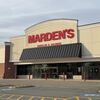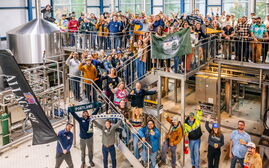Processing Your Payment
Please do not leave this page until complete. This can take a few moments.
Marketing strategies challenge Maine’s craft distilleries
Luke Davidson sounds like a man whose head is spinning, a product of learning a lot about business in a little time. When Davidson opened the doors to Maine Craft Distilling in Portland this July, he didn't expect the large crowds that flocked to his East Bayside business to taste the distillery's craft batches of rum and vodka. The crowd surge created a number of logistical challenges, and it was all he could do to keep a supply of clean glasses and purchase bags handy.
“Sleep has not been a major piece of our story at the moment,” Davidson says.
He's not complaining. The crowds prove Davidson's hunch that spirits aficionados in the state are thirsty to try new, local craft-distilled drinks. In the last few years, local craft distilleries are carving out a niche in the Maine marketplace alongside the state's popular craft beer industry. Just over a half-dozen distilleries have opened for business in the state to date.
It was this hunch of a lucrative market, and a love for distilling, that inspired Davidson to work long hours to build and design his own stills. It wasn't easy; a still often sells for $300,000, an initial price that was too rich for him. Instead, he searched craigslist for parts and pieces from other food-processing businesses to construct his own. He's dubbed the finished product his “Frankenstill.”
Now Davidson must focus his efforts on gaining market share. Maine Craft Distilling has contracted with a pair of distributors to sell its products throughout the state, and he's in talks with Portland's influential mixologists and bartenders. His marketing emphasizes a “farm to flask” theme, which communicates that Maine Craft Distilling uses Maine-grown grains, carrots and molasses. Davidson now realizes that opening the doors to his business is just the beginning of his work.
“We finally got to the finish line of a long marathon and realized that this is the beginning of the race,” he says.
Standing out
Small-batch distillers must be dedicated to their craft to even get to the point of selling a bottle of spirits, says Bill Owens, president of the American Distilling Institute, an organization dedicated to supporting craft distillers. Whereas some craft beer brewers can start selling their products after an initial investment of as little as $10,000, craft distillers often face startup costs of $100,000 or more, he says. And distilling is mostly trial and error, as there are few classes on the subject, he says.
“The initial learning curve is so high that nobody comes into this and fails,” Owens says. “It separates out the [hobbyists from the professionals] really quickly.”
And there are growing ranks of distillers. In 2003, the American Distilling Institute counted 69 craft distillers with distilled spirits plant licenses in the United States and Canada, a number that now stands at 400 and is projected to hit 600-800 by 2015. Although they represent less than 1% of spirits sold in the United States, their volume and sales in 2012 increased roughly 25%, according to an ADI summer survey.
Maine craft distillers have received positive buzz in distilling circles, both locally and nationally. Both Twenty 2 Vodka and Cold River Vodka, from Brewer and Freeport respectively, have won national awards against some big labels, for example. But creating a buzz and creating a successful business are two separate things, says Scott Galbiati, owner of Twenty 2 Vodka.
“The biggest challenge of our industry is selling it,” Galbiati says. “The big players, the Smirnoffs, the Absoluts, they have old money and deep pockets.”
To get noticed in the marketplace, Maine craft distillers must focus on differentiating themselves from mass distillers, Galbiati says. That means paying attention to detail to create an unique experience for customers. It's why Twenty 2 Vodka decided to use corn over potatoes to make vodka with a distinct flavor signature, he says.
That ethos of differentiation also carries over to marketing efforts. Twenty 2 Vodka features hand-signed bottles to create buzz, for example, while larger spirits companies might shoot T-shirts from a T-shirt gun on spring break to get attention, he says.
“The big players out there have created these minimum expectations,” Galbiati says. “We can either spend what they spend or be very creative.”
But getting that distinct message across can be difficult in the competitive spirits marketplace. The marketing roll-out for Maine craft distillers often involves some trial and error. Maine Distilleries LLC in Freeport, which sells Cold River Gin and Vodka, first tried to go head-to-head with larger spirits companies in New York City — considered the Super Bowl of the spirits marketplace — but they found spirits distribution to be a cutthroat business. They were simply outgunned in their marketing budget, says Chris Dowe, head distiller with Maine Distilleries.
“Some of the vodka companies when we started would give a bottle away for every bottle they sold,” Dowe says. “We just couldn't do that.”
Dowe's company retooled its marketing strategy to go small scale and focus on New England markets, where its own “farm to flask” community-minded message resonates. Maine Distilleries, which grows its own potatoes for its products, donates a pound of potatoes to New England food shelters for every bottle sold, an altruistic strategy that has created a lot of positive buzz in New England. The company also has found a niche market that has allowed it to gain a more solid foothold in New York City, as word has gotten out among the Hassidic Jewish community that Cold River's potato-based spirits are kosher.
“We've been getting calls from rabbis since the day we opened,” Dowe says.
Owens has heard similar stories of niche-marketing success from other members of the American Distilling Institute. It's hard for craft distillers to break through the noise to catch fire in big markets, he says, but there are other avenues that are profitable.
“You're not going to crack the market nationally. That's not possible,” Owens says. “Why would you want to? There are plenty of places to sell your product.”
A nod to their beer brethren
The craft distillery industry is traveling a business path blazed largely by the craft beer business about a decade ago, says Dee Dee Germain, a spokeswoman for the Allagash Brewing Co. in Portland. She believes craft distillers find themselves in roughly the same position as pioneering brewers a generation ago. When Allagash first began selling beer in the mid-nineties, there were only a few craft breweries in the United States and none offered the Belgian-style beer that was the company's specialty, says Germain. The situation presented both a challenge to break into the marketplace and an opportunity to offer something completely new to consumers, she said.
There's a lot of cross-pollination between craft brewers and craft distillers in the state, says Germain. Ned Wight, owner of New England Distilling in Portland, for example, also was one of the first Allagash employees. Wight says craft brewers made their mark with unusual beer flavors that big beer companies wouldn't dare to offer, but that just cracked the door open for consumers.
“[New flavors] were a huge thing for the consumer to get them fired up about trying our stuff,” Wight says. “After that, it fell on the brewers to not only provide new and interesting products, but also really nail down quality.”
Wight says he's seeing a similar level of excitement among locavores for craft distillery products. And distillers have a distinct advantage over pioneering craft brewers in that the locavore movement has taken root throughout New England and it has created an opportunity for Maine distillers to gain market share.
“We just have to hold up the rest of the bargain on the quality end,” Wight says.
While Boston remains a lucrative market for spirits, Maine's craft distillers also are focusing much of their energies on sales within the state. Their efforts might get a boost from new legislation. This summer, Gov. Paul LePage signed a new law that calls on the state to renegotiate a more favorable liquor contract with a principal wholesale liquor distributor than the contract that has been in effect for the last decade. Gerry Reid, director of the Bureau of Alcoholic Beverages and Lottery Operations, believes the legislation will slow the flow of Maine liquor dollars to New Hampshire by cutting prices, which he believes will help local craft distillers gather steam in Maine.
Reid believes that Maine's distillers are doing a good job getting their product before consumers, but he stresses they need to focus on pre-selling their products to small, independent liquor stores, which can provide important shelf space and visibility.
“They really need to impress the store that this is a great product and this is going to sell,” he says.
Davidson is planning for the moment to focus on networking with local mixologists and bartenders at bars and restaurants in Portland to create promotional information on how to use Maine Craft Distilling's products to make unique mixed drinks. But with limited resources and time, he knows he's going to have to improvise and do the best he can now that his craft distilling business has opened its doors.
“There has not been a moment of downtime,” Davidson says.

















Comments